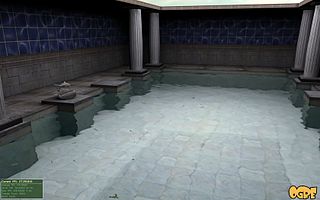 W
WDask is an open source library for parallel computing written in Python. Originally developed by Matthew Rocklin, Dask is a community project maintained and sponsored by developers and organizations.
 W
WGensim is an open-source library for unsupervised topic modeling and natural language processing, using modern statistical machine learning.
 W
WJinja is a web template engine for the Python programming language. It was created by Armin Ronacher and is licensed under a BSD License. Jinja is similar to the Django template engine but provides Python-like expressions while ensuring that the templates are evaluated in a sandbox. It is a text-based template language and thus can be used to generate any markup as well as source code.
 W
WKivy is a free and open source Python framework for developing mobile apps and other multitouch application software with a natural user interface (NUI). It is distributed under the terms of the MIT License, and can run on Android, iOS, GNU/Linux, macOS, and Windows.
 W
WPyQt is a Python binding of the cross-platform GUI toolkit Qt, implemented as a Python plug-in. PyQt is free software developed by the British firm Riverbank Computing. It is available under similar terms to Qt versions older than 4.5; this means a variety of licenses including GNU General Public License (GPL) and commercial license, but not the GNU Lesser General Public License (LGPL). PyQt supports Microsoft Windows as well as various flavours of UNIX, including Linux and MacOS.
 W
WPySide2 is a Python binding of the cross-platform GUI toolkit Qt, currently developed by The Qt Company under the Qt for Python project on porting PySide to work with Qt 5 instead of Qt 4. It is one of the alternatives to the standard library package Tkinter. Like Qt, PySide2 is free software. The project started out using Boost.Python from the Boost C++ libraries for the bindings and later switched to the binding generator Shiboken to reduce the size of the binaries and the memory footprint.
 W
WPython-Ogre is a Python binding for the OGRE 3D engine, designed to provide the functionality and performance of OGRE with the accessibility and ease of use of Python to facilitate the rapid development of 3D games and to make the OGRE engine more accessible to the beginner, who might otherwise be daunted by the technicalities of writing in the native C++. The performance of the engine is decreased in comparison to the original C++ demos, however the original OGRE engine provides such high performance that the performance of Python-Ogre is still more than acceptable for all but the most graphics-intensive games.
 W
WPyTorch Lightning is an open-source Python library that provides a high-level interface for PyTorch, a popular deep learning framework. It is a lightweight and high-performance framework that organizes PyTorch code to decouple the research from the engineering, making deep learning experiments easier to read and reproduce. It is designed to create scalable deep learning models that can easily run on distributed hardware while keeping the models hardware agnostic. PyTorch Lightning provides the ultimate flexibility for any type of research, and reduces the engineering boilerplate required to implement state-of-the-art AI features.
 W
WRDFLib is a Python library for working with RDF, a simple yet powerful language for representing information. This library contains parsers/serializers for almost all of the known RDF serializations, such as RDF/XML, Turtle, N-Triples, & JSON-LD, many of which are now supported in their updated form. The library also contains both in-memory and persistent Graph back-ends for storing RDF information and numerous convenience functions for declaring graph namespaces, lodging SPARQL queries and so on. It is in continuous development with the most recent stable release, rdflib 5.0.0 having been released on 18 April, 2020. It was originally created by Daniel Krech with the first release in November, 2002.
 W
WRequests is a Python HTTP library, released under the Apache License 2.0. The goal of the project is to make HTTP requests simpler and more human-friendly. The current version is 2.25.0
 W
WRPyC, or Remote Python Call, is a Python library for remote procedure calls (RPC), as well as distributed computing. Unlike regular RPC mechanisms, such as ONC RPC, CORBA or Java RMI, RPyC is transparent, symmetric, and requires no special decoration or definition languages. Moreover, it provides programmatic access to any pythonic element, be it functions, classes, instances or modules.
 W
WSimpleITK is a simplified, open-source interface to the Insight Segmentation and Registration Toolkit (ITK). The SimpleITK image analysis library is available in multiple programming languages including C++, Python, R, Java, C#, Lua, Ruby and Tcl. Binary distributions are available for all three major operating systems.
 W
WSimPy is a process-based discrete-event simulation framework based on standard Python. Its event dispatcher is based on Python's generators and can also be used for asynchronous networking or to implement multi-agent systems.
 W
WspaCy is an open-source software library for advanced natural language processing, written in the programming languages Python and Cython. The library is published under the MIT license and its main developers are Matthew Honnibal and Ines Montani, the founders of the software company Explosion.
 W
WSQLAlchemy is an open-source SQL toolkit and object-relational mapper (ORM) for the Python programming language released under the MIT License.
 W
WTwisted is an event-driven network programming framework written in Python and licensed under the MIT License.
 W
WwxPython is a wrapper for the cross-platform GUI API wxWidgets for the Python programming language. It is one of the alternatives to Tkinter. It is implemented as a Python extension module.